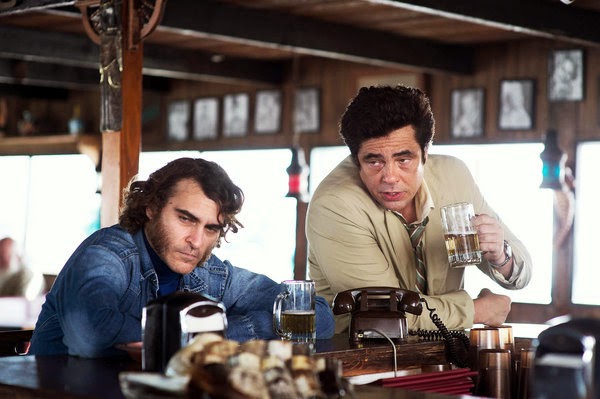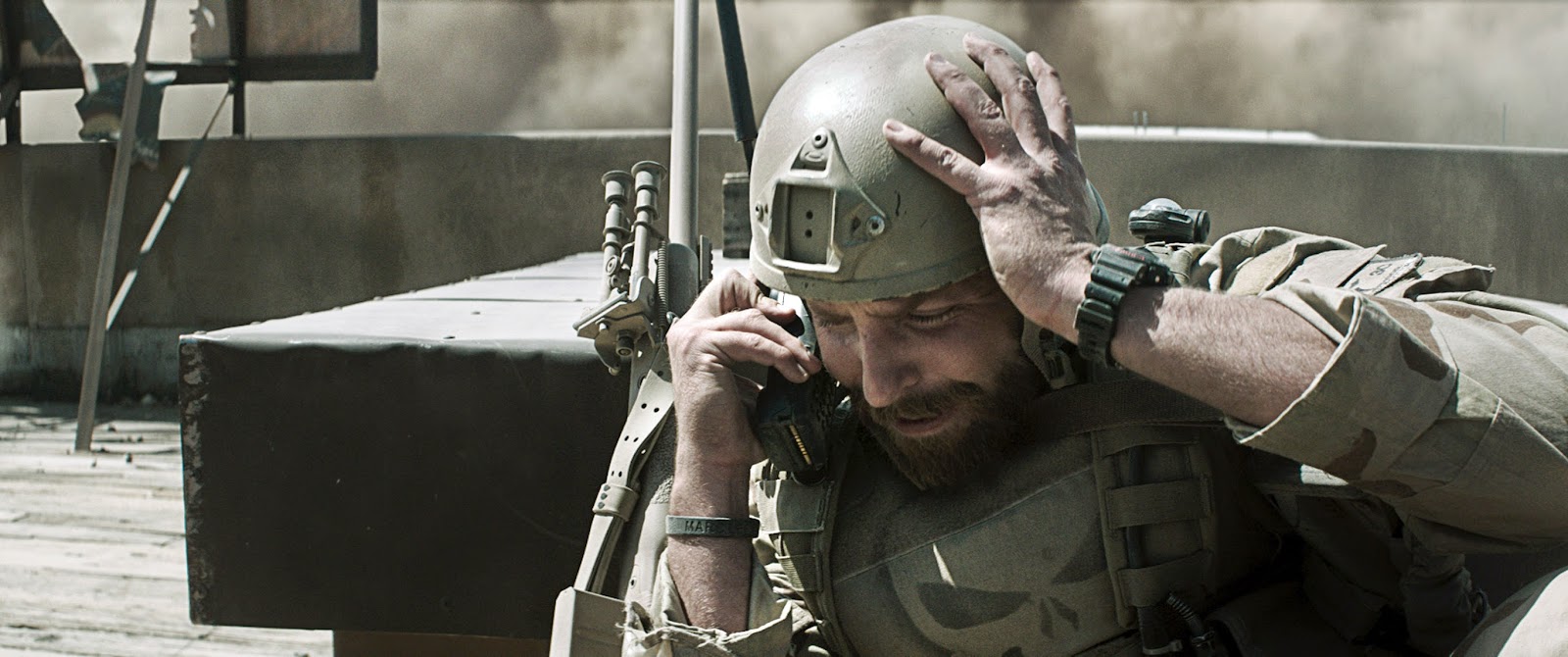*As always, I write these articles under the assumption that you’ve seen the film, so...SPOILERS. (This also applies to Once Upon a Time...in Hollywood.)
I’m still sticking with my current monthly plan of Van Damme, Oedekerk, and western, but getting a chance to see Once Upon a Time...in Hollywood inspired me a bit. That’s why I went ahead and wrote a review of that, but it also made me want to revisit Inherent Vice. Basically, I wanted to rewatch Once Upon, but that wasn’t a possibility for me, so I went with the film it most reminded me of with Inherent Vice.
Once Upon a Time...Inherent Vice
There are some obvious connections between these two films (the setting, the Manson references, the comedic tone, etc.), but the main connection I found was both films’ theme dealing with the end of an era. It’s as if Inherent Vice’s world is what Tarantino wanted to prevent by changing history at the end of his fairy tale. That’s probably why Once is a much lighter, funnier film than Inherent Vice.
In Inherent Vice, the overall point (as far as I’m concerned, anyway) was the death of the carefree ‘60s and the birth of the paranoid ‘70s. This is evidenced by the general tone, especially the music, of the film, but it’s pretty obvious with the plot, when you can follow it, that is. You see the co-opting of the hippie movement (Bigfoot playing a hippie in a commercial, Owen Wilson being planted within the community by a government agency), and the general fear of hippies and drug users because of Charles Manson (when the cop pulls over Doc with Dr. Blatnoyd, Japonica, and Denis he lists all the things they’re on the lookout for and Denis even namedrops Manson). You get the sense that within Doc’s own life things were simpler when he was with Shasta, but now things have changed and it seems like everything is controlled by sinister forces. So even when they seem to end up together at the end, Doc is still looking in the mirror behind him, as if someone might be following him. Things will never be the same.
This is what Tarantino laments in Once Upon a Time...in Hollywood. He’s more specifically concerned with Hollywood (hence, the title) than the general culture, but it’s still about how the Manson murders helped put an end to a carefree era. You get the sense of foreboding with Once Upon anytime you see the Manson women (hitchhiking, dumpster diving, etc.), and it comes to the forefront when Cliff ends up at the ranch, in an amazingly tense, creepy sequence. Overall, things are kept fairly light because Tarantino’s film is a fairy tale, not only for the main characters of Rick and Cliff, but for all of Hollywood, as well. Tarantino’s film posits that stopping Manson’s followers could let that world stay the same. You could argue that stopping Manson’s followers would not have stopped the change in our culture, but it is a fairy tale, so in that world maybe it could have.
This is why I think Inherent Vice and Once Upon a Time...in Hollywood make a great double feature. And it doesn’t matter what order you watch them in. If you go with Vice first, you see a more historically accurate change in the culture, and if you follow that with Once Upon, you get to what things were like before and how it could have been avoided. I think it works better with Hollywood first, though. In that order, you get to see this world and its alternate history, and Inherent Vice becomes this darker sequel about what would have happened if things went differently at the end of Hollywood. Either way, both films create a world I wouldn’t mind spending an afternoon in.
It’s weird feeling nostalgic for an era I never experienced.
Feeling nostalgic for the world of either film is strange since I wasn’t alive during this time. It’s nothing new to want to live in a fictional world that I don’t personally identify with (like, say, wanting to live in the world of Star Wars even if I would have probably just been a moisture farmer or nerf herder…), but to feel a bit of nostalgia for a real time period I didn’t experience is a strange feeling because it’s a world I almost experienced.
I was born in 1984, so most of my childhood memories are late ‘80s/early ‘90s. To me, those were carefree times, but I’m sure they weren’t to adults who had grown up in the ‘50s and 60’s. So I think this feeling that the world changed because of one or more events is something that happens to every generation. For me, it’s 9/11. But that also happened during my senior year of high school, a common time for people to start thinking more about the world instead of their own silly lives.
My generation is unique, however, in that we will be the last people to remember a time of landline phones, no internet (at least no internet in its current ubiquitous form[fun fact: Pynchon included a subplot about the beginnings of the internet in the book, so even that was covered to a degree]), no DVR, etc. I still remember a time when driving around was a thing, and people had to track each other down to hang out and make plans. We had to look things up the hard way, and the world could be more interesting and mysterious due to our lack of information. Now, with information both real and fake being presented at a nonstop rate, it’s easy to look back to my childhood, or an era like the ‘60s, and think, “Man, I wish things were like that again.” This is all ignoring the common issues with nostalgia, by the way, like the fact that no time period is ever as great or simple as you remember it, and odds are it was a terrible time period for entire groups of people different than yourself. But at face value, that’s where my nostalgia for an era I never experienced comes from.
That written, it’s not so crazy to feel like there was a time in my life that was similar to Inherent Vice and Once Upon a Time...in Hollywood. With Vice, the main thing that comes across to me is the generally hanging out feeling I get as Doc seems to randomly wander through the story. I feel like high school was like that a bit: just living in the moment, not worrying too much about the future. As for Hollywood, I feel like the movies I grew up watching aren’t really made anymore, so Hollywood has changed for me. Once again, I think this happens to every generation, and it has a lot more to do with getting older than it does with cults and terrorists. But who wouldn’t want to live in a fairy tale where these terrible things never happened?
Why do I own this?
It’s a Paul Thomas Anderson movie.
Random Thoughts
“Someone might be watching.” The foreboding beginning is brought full circle in the final moments of the film as Doc keeps checking his mirror as if he’s checking for a tail. The era of paranoia had begun.
Brolin in that commercial at the beginning is the most subtly threatening hippie of all time.
“So while suspect, that’s you, was having alleged midday nap so necessary to the hippie lifestyle…”
Doc watching Bigfoot eat that chocolate-covered banana…
Now that I’ve seen Once Upon a Time...in Hollywood, I get the joke Doc makes to the FBI guys about “missing” an episode.
“What’s a Puck Beaverton?” Reminds me of one of my favorite lines from Game of Thrones: “What the fuck’s a Lommy?”
“[F]rom a bass player turned record company executive, which trend watchers took as further evidence of the end of Hollywood, if not the world as they know it.” I think of this and Once Upon as films very much about the end of Hollywood and the world as people knew it back then.
“‘Gee,’ he thought, ‘I don’t know.’”
I kind of disliked/didn’t pay much attention to Sortilege’s narration the first couple times I watched this. Watching it now, I feel like her narration, while nonsensical at times (the astrology stuff, but maybe that’s just me), actually sums up a lot of the film’s themes.
“Are you sayin’ that the U.S. is somebody’s mom?”
The Last Supper image with the pizza is one of my favorites. It beautifully visualizes Owen Wilson as Christ-like (mainly in that he has returned from the “dead”), and I remember reading about it in the book and PTA captured it perfectly.
I never give this film enough credit for being a love story. That scene with Doc and Shasta looking for dope after calling the number from the Ouija Board is a great moment that effectively captures what it’s like to be in a great relationship during a carefree time. It is the perfect subplot (in a film that seems to be nothing but subplots) for the theme of innocence lost as paranoia sets in. In the film, that theme applies to the changing culture in America at the time, but it can also apply to Doc and Shasta’s relationship in the end. They seem to be slightly back together, but the innocent, carefree love of before is gone. Doc is driving forward, as is their relationship, but who knows where it’s headed now? And when did he start worrying about where things were headed? Perhaps that’s the real loss of the hippie culture of the ‘60s. People stopped living in the moment are started living in fear of the future. But what do I know? I was born in 1984.
“You know it?”
“Shakes a tambourine.”
I have to remember to start using that instead of “rings a bell.”
This is the first time I noticed that Japonica’s dad was with the Voorhees-Krueger law office. Of all the unexpected elements of this film, a reference to Jason and Freddy is pretty high on the list.
“God help us all. Dentists on trampolines.”
“Did I hit you?”
I guess I just have a soft spot for movies that are about an end of an era without being too obvious about it.
“So you guys been working for the Golden Fang long?”
In the end, Shasta references it being like the Ouija day, and it being “Just us.” But Doc looks suspicious of this now.
“Under the paving-stones, the beach!” I forgot this text was at the end of the credits. I think it fits in with my general thoughts about the theme of the film, in that the corruption, drugs, and paranoia in general became the paving stones while enjoying a simpler life was the beach.















